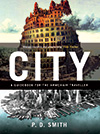Science & the city
28 June 2007 | Reviewing, Science & literature, Writing & Poetry | 4 comments
 I've just been reviewing a fascinating new book on German-speaking exiles in Los Angeles during the 1940s and 50s - Erhard Bahr's Weimar on the Pacific. (Only Thomas Mann could look as miserable as that in California.) As many as 15,000 refugees from fascism made their way to California, most ending up in the city of the angels - although Brecht rather ungratefully likened the city to hell. They included Arnold Schoenberg, Fritz Lang, Franz Werfel, and Alfred Döblin.
I've just been reviewing a fascinating new book on German-speaking exiles in Los Angeles during the 1940s and 50s - Erhard Bahr's Weimar on the Pacific. (Only Thomas Mann could look as miserable as that in California.) As many as 15,000 refugees from fascism made their way to California, most ending up in the city of the angels - although Brecht rather ungratefully likened the city to hell. They included Arnold Schoenberg, Fritz Lang, Franz Werfel, and Alfred Döblin.
Some, like Brecht, were hard-boiled former residents of the sin city that was Berlin in the 1920s and they felt alienated (for want of a better word) in this verdant, Arcadian city. Döblin for one complained about the lush greenness that he saw everywhere. Reading this reminded me of an article I did a while back on Döblin's wonderful modernist novel, Berlin Alexanderplatz (1929), for Alan Ross's London Magazine. As I don't suppose it's available online, I thought I'd post it on my own site. It explores the scientific themes in the novel and shows how these are rooted in Döblin's own training in psychiatry. He was one of many German-speaking writers in the twentieth century who had a scientific background and who often brought science into their work. If you've not read Döblin's novel, I'd certainly recommend it. And to get you in the mood, you can read my article here.


shannon | 29 June 2007
Interesting article. I find that I learn more about a piece sometimes by a thoughtful review of it, rather than reading it. Or is that just me being lazy? Although I should probably add this one to my reading list. I'm a big believer in life being one big pattern, the large mirroring the small in...how did you say it... a microcosmic reflection? I have a short story called "Demon in the Bell Jar" that shows how our lives mirror Maxwell's thought experiment. Fate being the demon in the bell jar—the one who opens and closes the door, allowing opportunity to speed up one person’s success and slow down the other’s.
"It remains the ‘unknown quantity’ that offers individuals the potential to rise above the law-governed materiality of their lives and to take control of their destiny."
Perhaps this is what seperates us from nature? Evolved humanity, a seperation from the physical laws which I suppose some would call a soul.
Thanks for sharing this.
Paul Halpern | 02 July 2007
Mann does look very serious in that photo. But he seems to have had an indelible influence on the culture of the City of Angels, namely Mann's Chinese Theatre and Magic Mountain amusement park:
http://www.manntheatres.com/chinese/
http://www.sixflags.com/magicmountain/index.aspx
Brecht doesn't seem to have fared as well in the LA entertainment business, but perhaps an investor reading this blog might think about opening a Pirate Jenny Land and a Mac the Knife Carvery somewhere in town.
PD Smith | 02 July 2007
Thanks for those truly surreal links, Paul. I'm sure they would have made even Thomas Mann smile... (or on reflection, maybe not!)
PD Smith | 10 July 2007
Thanks Shannon - I think a lot of people read reviews for this reason...there are simply too many books published to read them all, unfortunately! Nothing to be ashamed of...
Do you know the novel 'Hopeful Monsters' by N Mosley? It explores some of those ideas you raise. You might want to add that to your list too...!